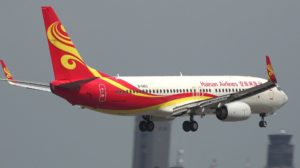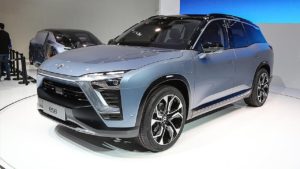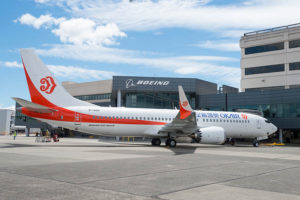SHANGHAI (Reuters) – Foreign airlines that fly on 20 popular long-haul routes to China will face fresh competitive pressure as Beijing begins to ease decade-old restrictions on Oct. 1, allowing more Chinese carriers to offer service.
The change affects about 20 percent of Chinese long-haul daily capacity, according to data compiled for Reuters by Chinese aviation data firm Variflight.
It will turn up the heat on U.S. and European carriers like United Airlines (UAL.O) and Air France KLM (AIRF.PA), which have higher costs, lower outbound demand from their countries and less cultural appeal to Chinese travelers.
“The North American and European airlines are no match for the Chinese carriers,” said Corrine Png, chief executive of Singapore-based transport consultancy Crucial Perspective, citing the majority of traffic being driven by Chinese customers.
Some have already abandoned Chinese routes, with American Airlines (AAL.O) recently planning to drop Shanghai-Chicago service after also cancelling Beijing-Chicago and describing the routes as a “colossal loss-maker” that cost it $30 million a year.
The “one route, one airline” policy had been in place since 2009; altering it now is a response to the changing aviation market, China’s Civil Aviation Authority has said.
Two of the routes, Shanghai-Paris and Shanghai-Frankfurt, already have two Chinese airlines flying them but can add one more.
‘LITTLE INFLUENCE’
Variflight’s chief data analyst, Cong Wei, said Chinese airlines controlled about 50 percent of the seats on the 20 routes, which include Beijing-Los Angeles and Shanghai-London, and had the potential for a much higher share.
These routes are divided up between state-controlled carriers China Eastern Airlines Corp Ltd <600115.SS>, China Southern Airlines Co <600029.SS> and Air China Ltd <601111.SS>.
They compete against foreign airlines including Air France KLM, Lufthansa (LHAG.DE), Air Canada (AC.TO), British Airways (ICAG.L), Virgin Atlantic [VA.UL], Air New Zealand (AIR.NZ), United Airlines, Delta Air Lines (DAL.N) and American Airlines.
An Air France KLM spokeswoman said the company was monitoring the regulation change but had “very little influence on how this rule could evolve.”
“Competition between Europe and China is already present and increasing,” the spokeswoman said. “We continue to enhance our existing partnerships to offer the most attractive products and services at competitive fares to all our customers. This is undoubtedly the best response to this eventuality.”
Delta Air Lines said China continued to be an important market for its long-term network and that it was well positioned because of its partnership with China Eastern. Air New Zealand said it was aware of the change and was constantly assessing new route opportunities.
Lufthansa, Air Canada, British Airways, Virgin Atlantic, United Airlines and American Airlines did not respond to requests for comment.
TIE-UPS
The policy would also likely hurt incumbent Chinese airlines like Air China, which under the old rules had been able to dominate the Beijing-Los Angeles route. Many Chinese airlines are already facing falling returns on their international business.
Rivals like Hainan Airlines <600221.SS>, China’s fourth-largest carrier, have been expanding their international business in secondary routes and could take on new ones, analysts said. Out of the 20 routes opening for competition, Hainan only flies between Beijing and Toronto.
China Eastern and China Southern, headquartered respectively in Shanghai and Guangzhou, are also expected to launch new routes from Beijing once the Chinese capital’s new second airport opens in late 2019, giving the two state-owned airlines secondary bases.
The opening of Beijing Daxing International Airport was a catalyst for the government’s decision to change the route policy, the Chinese aviation regulator said in May.
China Southern said it supported the policy change, while China Eastern declined to comment. Air China and Hainan Airlines did not respond to requests for comment.
Li Xiaojin, a professor at the Civil Aviation University of China, said foreign carriers could focus on developing services for the luxury end of the Chinese market or deepen recently forged tie-ups with Chinese carriers to try to retain a competitive edge.
Delta Air Lines and American Airlines respectively have small equity stakes in China Eastern and China Southern, while China Eastern owns a 8.8 percent stake in Air France KLM.
But Li said the ultimate winner would be Chinese travellers.
“By liberalizing international air rights, airlines will put more capacity on popular routes, at hot timings … and provide passengers with safe, more convenient, more comfortable and economical services,” he said.
(Reporting by Brenda Goh; Additional reporting by SHANGHAI Newsroom; Editing by Gerry Doyle)






